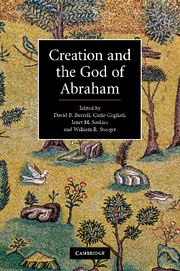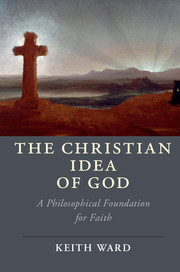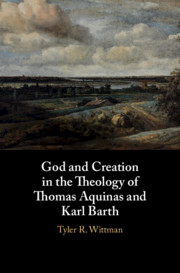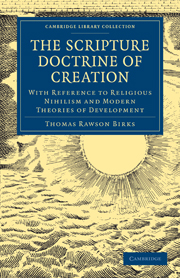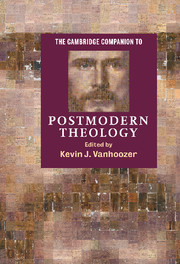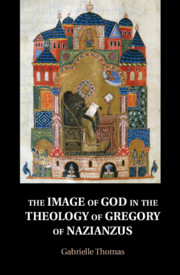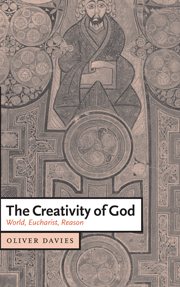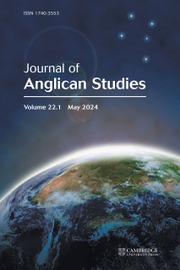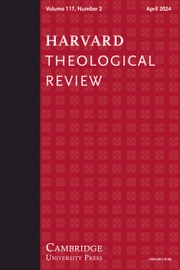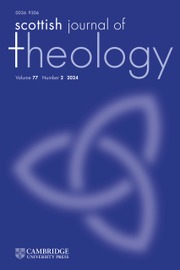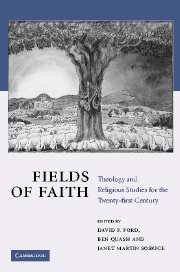Creation and the God of Abraham
- Editors:
- David B. Burrell, Uganda Martyrs University
- Carlo Cogliati, Clare Hall, Cambridge
- Janet M. Soskice, University of Cambridge
- William R. Stoeger, University of Arizona
- Date Published: August 2013
- availability: Available
- format: Paperback
- isbn: 9781107697270
Paperback
Other available formats:
Hardback, eBook
Looking for an inspection copy?
This title is not currently available for inspection. However, if you are interested in the title for your course we can consider offering an inspection copy. To register your interest please contact [email protected] providing details of the course you are teaching.
-
Creatio ex nihilo is a foundational doctrine in the Abrahamic faiths. It states that God created the world freely out of nothing - from no pre-existent matter, space or time. This teaching is central to classical accounts of divine action, free will, grace, theodicy, religious language, intercessory prayer and questions of divine temporality and, as such, the foundation of a scriptural God but also the transcendent Creator of all that is. This edited collection explores how we might now recover a place for this doctrine, and, with it, a consistent defence of the God of Abraham in philosophical, scientific and theological terms. The contributions span the religious traditions of Judaism, Christianity and Islam, and cover a wide range of sources, including historical, philosophical, scientific and theological. As such, the book develops these perspectives to reveal the relevance of this idea within the modern world.
Read more- Provides an in-depth accessible treatment of the idea of creation
- Connects with the contemporary scientific accounts of origins, enabling readers to identify the distinction between theological and scientific approaches and appreciate the implications of these differences
- Brings together the teaching which is central to Judaism, Christianity and Islam, providing the reader with an overview of the approaches to creation within these faiths
Reviews & endorsements
Review of the hardback: 'This book is an example of inter-faith dialogue at its most constructive … This collection is a magnificent achievement. It left me hoping for a thoroughgoing formulation of 'theology and science' which started from what this book lays before us. I venture that almost all we need for the renewal of that field could be found in this exceptional volume.' Church Times
Customer reviews
Not yet reviewed
Be the first to review
Review was not posted due to profanity
×Product details
- Date Published: August 2013
- format: Paperback
- isbn: 9781107697270
- length: 288 pages
- dimensions: 229 x 152 x 15 mm
- weight: 0.39kg
- contains: 1 table
- availability: Available
Table of Contents
List of contributors
Preface David D. Burrell and Janet M. Soskice
Introduction Carlo Cogliati
1. Creation ex nihilo: early history Ernan McMullin
2. Creatio ex nihilo: its Jewish and Christian foundations Janet M. Soskice
3. The act of creation with its theological consequences David D. Burrell
4. Scotistic metaphysics and creation ex nihilo Alexander Broadie
5. Creation and the context of theology and science in Maimonides and Crescas Dan Davies
6. Creation: Avicenna's metaphysical account Rahim Acar
7. Four conceptions of creatio ex nihilo and the compatibility question Pirooz Fatoorchi
8. Will, necessity, and creation as monistic theophany in the Islamic philosophical tradition Ibrahim Kalim
9. Trinity, motion and creation ex nihilo Simon Oliver
10. The big bang, quantum cosmology and creatio ex nihilo William R. Stoeger
11. What is written into creation? Simon Conway Morris
12. Creatio ex nihilo and dual causality James R. Pambrun
13. God and creatures acting: the idea of double agency Thomas F. Tracy
14. Thomas Aquinas on knowing and coming to know: the Beatific vision and learning from contingency Eugene F. Rogers.
Sorry, this resource is locked
Please register or sign in to request access. If you are having problems accessing these resources please email [email protected]
Register Sign in» Proceed
You are now leaving the Cambridge University Press website. Your eBook purchase and download will be completed by our partner www.ebooks.com. Please see the permission section of the www.ebooks.com catalogue page for details of the print & copy limits on our eBooks.
Continue ×Are you sure you want to delete your account?
This cannot be undone.
Thank you for your feedback which will help us improve our service.
If you requested a response, we will make sure to get back to you shortly.
×
